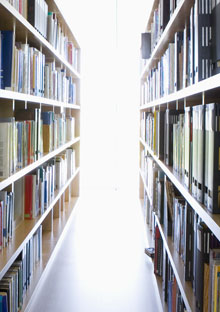Reading: A Love Story
How It Begins

© 2009 Jupiterimages Corporation
I look back now with amazement at all the small acccidents that put certain books before me, and how in my childhood I was taken up by them, as if by the strong arms of a parent I'd never known and been badly missing, to be carried inside to this warm safe place of reading. My mother read crime stories, exclusively and avidly, visiting the old mansion that served as the town library in those days and coming out most Saturdays with a pile of Crime Club novels protected in crinkly acetate covers. She did not read to me as a child—no one had read to her, and I suspect she thought that reading would be something I would naturally undertake when I was old enough to do it myself.
I attended Catholic school, where the nuns vaguely disapproved of books that were not meant for the classroom—you weren't allowed to have them with you during the day, even in your bag. The first books I got from the library were suggested by the librarian and involved talking pigs: I hated them, a realist to my core. Eventually, I found sports stories involving heroic kids who hit home runs in crucial Little League games, and biographies that were small and fat and came in orange covers. I remember best the biographies of Abe Lincoln, Lou Gehrig, and Phil Rizzuto (a shortstop for the Yankees before I was born, later a sportscaster). Someone gave me a Bobbsey Twins book, which I liked, and I read three of those before moving on to the Hardy Boys: While I couldn't have put a name to it then, the transition was from the sanitized to the erotic (speedboats, cars, penny loafers, chinos, girlfriends, and the mysterious unwed father), a giant leap that is essential to the making of a committed reader. I read with the flashlight under the covers, that old battery-sapping and deeply pleasurable cliché.
Later I took up the novels of the sea, The Mutiny on the Bounty trilogy and the Hornblower series, which I consumed at an alarming rate. None of the classics of childhood—Beatrix Potter, E.B. White, Tolkien—came before me. I did not read Dr. Seuss, who was immensely popular at the time, because my mother deplored him for what I gathered were political reasons. A onetime fan of Senator Joseph McCarthy, my mother had gotten the idea that Dr. Seuss was a Communist.
I remember whole summer days spent reading. When I was old enough to take an interest, I started to steal my mother's detective stories. They had sex and whiskey and cigarettes in them and so were the peak of forbidden sophistication. And I remember reading The Adventures of Tom Sawyer, the first book I ever got to the end of and immediately began reading again: To this day, that is a short list. Twain ends the book with an intriguing little conclusion in which he says that he wasn't quite sure where to stop his tale: that stories of grown people end in marriage, but that the author of a story about a boy must end it "where best he can." I was struck by those lines: The author was speaking directly to me, and telling me that he had written this thing, this world, this three-dimensional inner cinema; that he had made choices about it and wondered if they were the right choices. This was like the voice of God, it seemed to me, but it was warm, self-deprecating, witty. Twain's postscript confirmed for me something I couldn't have verbalized: that I was reading (as before I had listened to my transistor radio and watched television) in order to hear a voice, to get to know a character, a language, and ultimately an author. Knowing others, of course, is one way we know ourselves; being alone we know ourselves another way. Reading combines the two.



